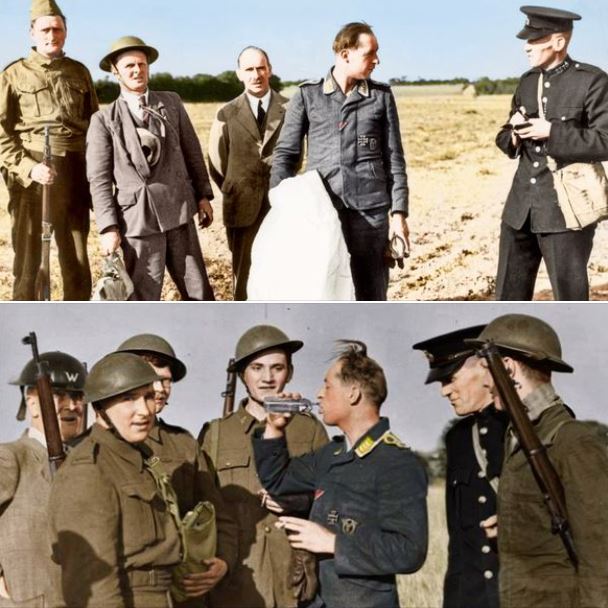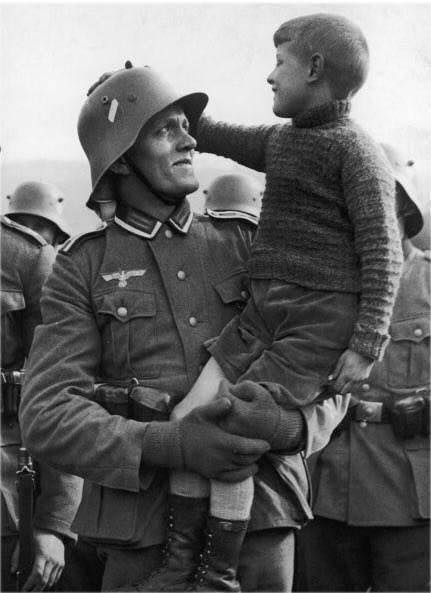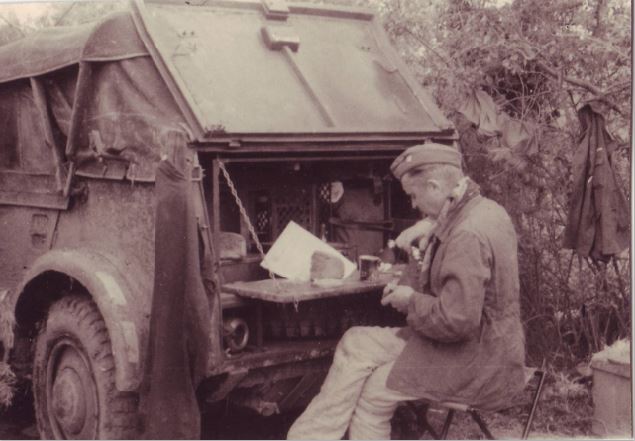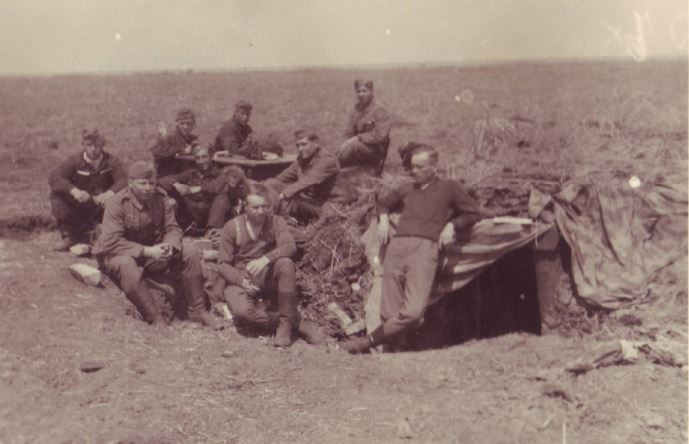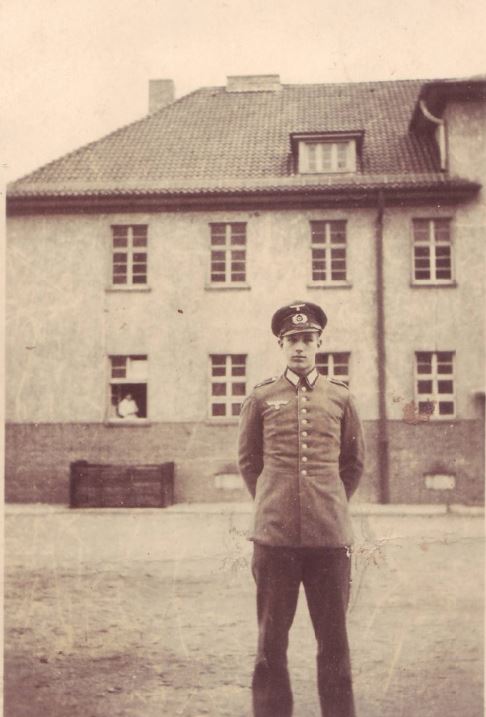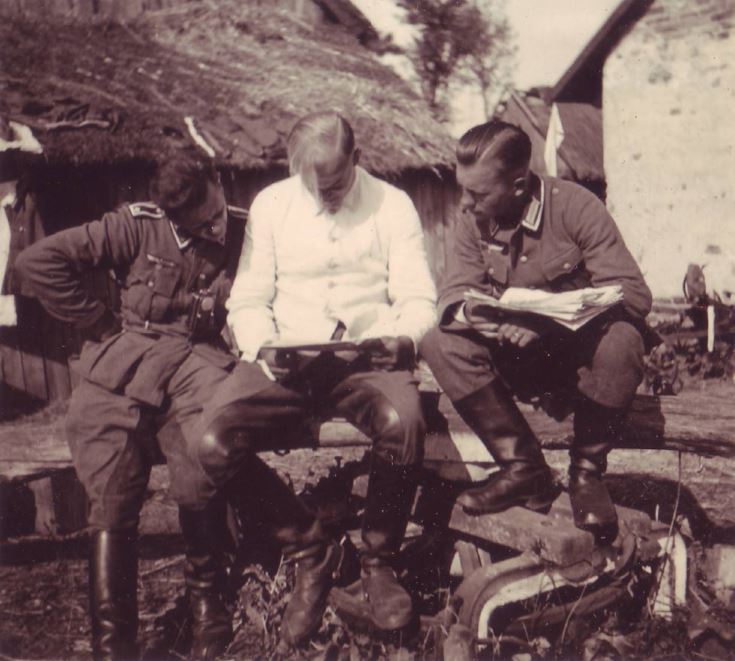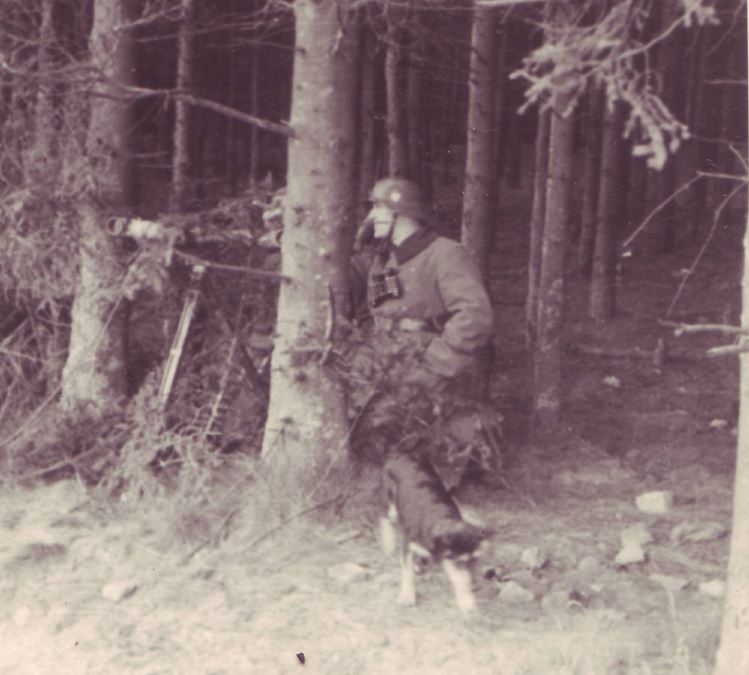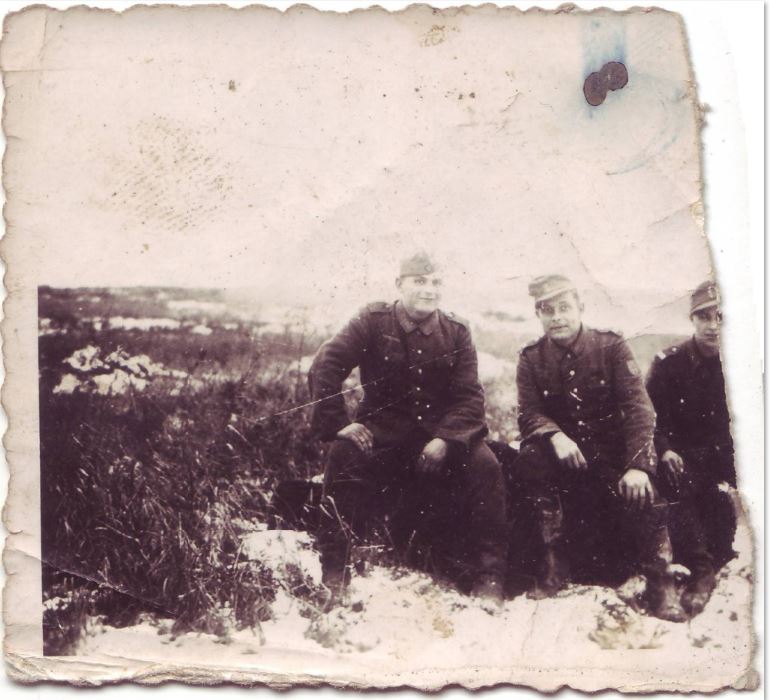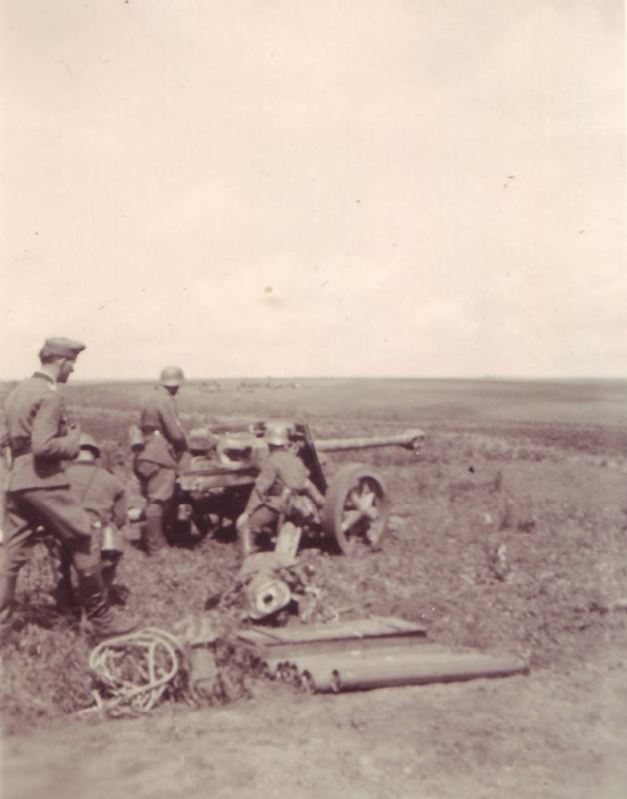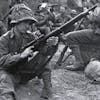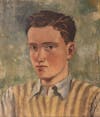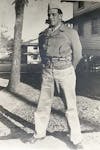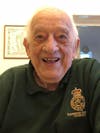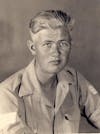46 Through German Eyes in the Second World War
A selection of stories dedicated to the German side of the second world war.
Stories about the German side of the Second World War.
"There was a vast number of ships, absolutely vast. I can tell you that my throat went dry painfully dry, and my hands began to shake. I wasn't the only man to be affected that way, one of the very young lads began to retch as if he was going to be sick. It was the effect of pure fear."
"For a couple of days the two sides just existed on opposite sides of a meadow with a tense safety. The Germans could hear the Americans sing songs in the evening, and likely vice versa. Then, one morning the engines of the Sherman tanks came to life …"
"My Grandfather was an Unteroffizier in charge of a small recon squad, sent out to investigate rumours of tanks - and fortunately they were equipped with a few disposable Panzerfaust anti-tank weapons …
"The day that my grandma got her drivers license in late 1945, she was on her way home from the Dept of Motor Vehicles when somehow she T-boned a truck carrying a load of German POWs …
Links - Not supported by all podcast players:
Normandy Memorial Trust Appeal - 75 veteran D-Day stories
Feedback/reviews in Apple Podcasts - Thank you.
German Soldier on the Eastern front in the Second World War. Courtesy The Other Side Archive

A great collection of German photos, as above:
"As the world grows older, it tends to forget. To fight against forgetting the past I started to collect WW1 and WW2 photographs. Collected from flea markets, antiques shops and even garbage bins, I try to keep the moments captured in the photos alive by sharing them with the world. Pictures were taken to be seen, and now they are."
https://theothersidearchive.wordpress.com/
A German parachutist is captured - hear the podcast to learn more, see the Facebook link above.
Interested in Bill Cheall's book? Link here for more information.
Fighting Through from Dunkirk to Hamburg, hardback, paperback and Kindle etc.
Facebook pic. A German soldier says a sad and solemn goodbye to his young son in WW2
Breakfast with interesting table - a Horch 108 staff car WW2 podcast
Group of German soldiers in their dugout near Sewastopol WW2
Heinrich-Dress-Uniform - From The other side archives
Soldiers reading Second World War
Sentry with puppy Second World War
Torn group photo in snow
PAK40 AT gun
Fighting Through Podcast - Episode 46 - Through German Eyes in the second world war
More great unpublished history! WWII
Your best Second world war podcast for WW2 history
….
"My Grandfather was an Unteroffizier in charge of a small recon squad, sent out to investigate rumours of tanks - and fortunately they were equipped with a few disposable Panzerfaust anti-tank weapons …
"For a couple of days the two sides just existed on opposite sides of a meadow with a tense safety. The Germans could hear the Americans sing songs in the evening, and likely vice versa. Then, one morning the engines of the Sherman tanks came to life …
"The day that my grandma got her drivers license in late 1945, she was on her way home from the Dept of Motor Vehicles when somehow she T-boned a truck carrying a load of German POWs …
There was a vast number of ships, absolutely vast. I can tell you that my throat went dry painfully dry, and my hands began to shake. I wasn't the only man to be affected that way, one of the very young lads began to retch as if he was going to be sick. It was the effect of pure fear.
Once the Americans had firm ground under their feet they waded into long lines one after the other through the water, with the left-hand firmly on the pack of the man in front. Everything was so calm, so organised, that you had the impression that they were merely carrying out an exercise. We were well aware that the gi’s were being led like lambs to the slaughter.
Hello again
I’m Paul Cheall, son of Bill Cheall, whose Second world war memoirs have been published by Pen and Sword – in FTFDTH. The aim of these podcasts is to give you the stories behind the story. You’ll hear first-hand memoirs and memories of veterans connected to Dad’s war in some way – and much more.
Over the last few years, I’ve been lucky enough to be sent some wonderfully poignant, sometimes violent, stories and sentiments about the German side of the second world war. Most history books tend to dwell on the allied experience of the war, with tales of allied victories and exploits. Today I’m going to share some great unpublished history with you from the German perspective. And whilst I was looking around for extra material to supplement what I’d been sent by you the listener, I stumbled upon a recently published book called Through German Eyes by Jonathan Trigg. Jonathan has kindly agreed to my reading out an entire chapter of his book, which will prove to be a great anchor for this episode. More on that later.
So I’m going to start off with some of the stories I’ve been sent or dug up from various sources and we’ll gradually work out way up to the outstanding book, D-Day Through German Eyes - How the Wehrmarcht Lost France - Jonathan Trigg
You heard a few teasers in the intro and I can promise you some great stories today, right through to a number of PS’s including a very poignant one about a German medic who shot one of his comrades deliberately.
Transition
Amy Bryant - Michigan USA – Email
I had a Great-Grandfather who fought in WWII...for the Germans. Full disclosure, I spent much of my life being mortified and disgusted by this fact and never shared it in conversations about the war. In my child's mind, I imagined him on the front lines shooting and killing Americans - or worse, being involved with concentration camps. The fact is, I have no idea. But one thing I'm sure about is that, like all soldiers, he did what he was told to do. No matter whether he agreed with it or not.
Something he told my Grandfather (his son) does stick in my mind though. Like most veterans, he didn't talk about his experiences in the War. But when pressed he told him that once he met American soldiers he was surprised, "they were just like us." That's all he said and the discussion was over. He moved to America shortly after the war ended where he married and had five children.
He was a difficult man to get to know and I don't remember him ever speaking or smiling. But the more I learn about the war, I'm surprised any of them have ever smiled again.
All of this is to say, "Thank you." Thank you for providing a podcast that gives acknowledgement to all soldiers who fought in the second world war. Thank you for helping me get to a place where I can respect my Great-Grandfather...no matter what part he played...because he deserves it. They all do.
Great Grandfather was called Ken in America. But my Great-Grandmother used to call him something else when she was mad at him. I always assumed this was either his given name or a German swear word. Alleshouse is our family name. Though, I'm told, in Germany, it was something more like Aleshaus. Many family members assume our ancestors must have owned a bar. I'm very unsure of the spelling it. I've been putting together a family tree on Ancestry.com but haven't quite reached the branches across the pond yet.
I wish I were able to talk to my Grandfather to glean some more stories. Unfortunately, he has been suffering from Alzheimer's for the last 9 years and he doesn't recognize me. Heartbreaking disease.
Your podcast has really motivated me to find out more about his experiences in the war. I'm even seriously contemplating contacting "that side of the family" to see if they have anything to share. Sadly, our family has never been close. This, however, could be the starting point of bridging those gaps. Your podcast may make many unintentional ripples. Now how good is that? Haha!
Well, Amy, THAT is very good indeed. I don’t think I can add anything to what you’ve said other than to thank you for your wonderfully conciliatory comments that beat anything I could have drummed up. And if there are any German nationals listening with the name Alleshaus or Aleshouse or similar who think they might have long lost American cousins, do get in touch. And if you do, How Good Would that be!!!!
On that note, I’m going to dive straight into my first listener contribution, which kind of echos the sentiment from Amy’s story.
This is from a gent from THE OTHER SIDE ARCHIVE:
He says “I am TK622 on Reddit, I have contacted you because you were looking for stories for your podcast. First of all, I've looked at your website and I like what you are doing. It is a great project and needs all the support it can get. The Other Side Archives. And TK has sent me some stories:
Tales from “The Other Side”
Bernard
I have a number of [second world war] combat stories from my Grandfather Bernard, who survived the war and was always rather open about his experiences, as part of dealing with them, I suppose.
He told me the stories whenever he could, much against the will of my Grandma. She said that little kid shouldn't hear war stories. As I grew older we got into details more, with him scribbling tactical drawings on newspapers and magazines to explain the layout of the places he was at.
He had a great saying "Taktik ist angwandte Strategie" "Tactics are applied strategies", basically meaning no matter how good the plan is, it comes down to how you execute it.
Sturm Regiment 14, 78. Sturm Division, Orsha, Eastern Front 1944.
The command heard unconfirmed reports of Russian tanks potentially gathering for an attack on German positions, in a location called the Triangle-Forest near a tiny village/large farm named Budi somewhere between Orsha and Vitebsk.
My Grandfather at the time was an Unteroffizier (Sergeant) and in charge of a small recon squad as part of his Officer training. His squad was sent out to investigate the rumors of the tanks. They were equipped with a few disposable Panzerfaust AT weapons to deal with the tanks if the situation allowed it.
The march towards the forest was uneventful, and soon the rumoured tanks were spotted. They were moving in a slow column through the forest, close to the location they were supposed to be in. It were only two or three, easy to eliminate with the weaponry at hand.
The soldier who fired the first shot with the Panzerfaust missed and hit a tree next to the tank. The sudden explosion understandably set the Russians to high alert. But they focused the alert on the wrong direction. The tanks stopped and all the turrets began rotating towards where the explosion was, suspecting the source of the explosion to be somewhere further that direction.
With one of the Panzerfausts wasted, they did not have enough to destroy the tanks.
A quick plan was needed. The plan the group agreed on was for one of the soldiers to use the confusion of the Russian T34 tanks, and run up to the one with the safest angle of approach and chuck a grenade down its barrel. Once the explosion went off the other soldiers would fire their Panzerfausts, hopefully taking out the other tanks.
Apparently the plan worked because they returned without getting in a direct engagement with the tanks. On the way back my Grandfather decided to check on the village/farm of Budi. It had burned down to the ground a couple of days earlier after prolonged fighting. The idea behind checking it again, was to see if there were any traces of recent enemy activities in the area.
In the middle of the village, amidst smoking ruins was a large fresh stack of wood. The squad immediately suspect foul play and went ready for combat. My grandfather said he could see a piece of wood move, then he yelled for his men to get ready to fire. At the same moment somebody pulled his arm and he fell to the ground, a shot ringing through the air. A Russian sniper had hidden in the wood stack, and taken aim at his head.
Because my Grandfather was pulled away at the last moment, the shot missed its mark and only hit him in the jaw. But the bullet went in under his right ear and exited below his left nostril, breaking the jaw bone and taking a bunch of teeth with it. …….Ouch! ………
His unit took care of the sniper, taking the cap of the marksman with them, as a gift for my Grandfather. He healed up fine, and continued his officers training. While he was in the hospital most of the 78. Sturm-Division got destroyed in combat during a Russian counter offensive. After completing the training he served as a Leutnant on the Western Front.
347 Infanterie Division, near Kaiserlautern Western Front 1945.
My grandfather had been freshly transferred to the unit as a Leutnant, to make up for heavy losses the unit suffered during the allied Rhine crossings called Operation Undertone.
The Germans were dug in behind a railroad embankment. They had a couple of tanks lined up behind the embankment, with only the turrets peaking over, overlooking a swampy meadow. The tanks had low fuel and had been placed there as a defensive line.
On the side of the meadow, a river flowed along the embankment, with a water mill / farm next to it. It had a chicken coop and some tall beanstalks. Now since a big building would be an easy target, the unit commander was staying in the chicken coop. My grandfather and his small recon squad were dug in among the beanstalks, the most forward position towards the enemy without having to enter the meadow with no cover in it.
On the far side of the meadow was a forest, the Americans had set up camp there. For a couple of days they just existed opposite each other amidst a tense safety. The Germans could hear the Americans sing songs in the evening, and likely vice versa.
Then, one morning the engines of the Sherman tanks came to life. One after the other, the distinct sound of radial engines echoed out of the woods. The noise of imminent attack set the Germans into high alert mode, the unit commander came stumbling from the chicken coop, struggling to get dressed, jumping around halfway in his pants, with his jackboots flying around, yelling commands.
Then the Shermans emerged from the woods, followed by infantry units. Needless to say, a swampy meadow with no cover is a bad place to attack. The narrow tracked Shermans got stuck, and were easy targets for the German tanks. One Sherman got hit in the ammo, sending the turret flying 5 meters into the air, spinning around like a child's toy. Other Shermans got destroyed, too. After that the details get fuzzy but the Germans lost the position, had to retreat, and a couple of days later, my Grandfather was taken prisoner.
He and some soldiers of his recon squad were separated from the unit and hid in a hayloft of a barn. It didn't take long until the advancing American troops took the farm and began sweeping it. Being a man with a rather realistic but optimistic outlook on his life, my grandfather made his presence known and surrendered peacefully along with his small group of soldiers.
The Americans searched him and were enthralled by his wrist compass and fountain pen. They played around with the pen and made it squirt ink, while another soldier complained that the watch (wrist compass) was broken. My grandfather later learned from an American officer that the unit which captured him was comprised of “Chicago prison folk” (He always used the English term the Officer told him with a big grin) who’d been given the choice of rotting in prison or going to war.
While the American soldiers were eating, still closely watching the captured Germans, one of the Americans would from time to time do the Nazi salut and say in broken German “So ist scheiße” (That is shit), amusing the Germans.
On the jeep drive to the collection camp for POWs, my grandfather saw an African American for the first time. German propaganda made African American soldiers seem like wild beasts with bones in their hair and a knife between their teeth. It was a pleasant surprise that the African American Jeep driver was a friendly and talkative guy.
Thanks to the language barrier the talk didn't go far beyond the most bare bones small talk, but my grandfather later often remarked that the Jeep driver was the nicest American he had met in the war.
T
TK thanks for that great story.
And you added: Granduncle Heinrich sent a poem home via Feldpost letter, one of the, if not the last, letters my Grandmother's family received from him before he went missing. And listener, next but one episode I’m planning another War Poetry episode, so you’ll have to listen in to that to hear Heinrich’s poignant poem, together with a load more military rhymes. Coming up soon.
TK, I took a look at your web site and there really are some great photos from the German side. In fact I wrote down what you say on your home page – well, actually I didn’t write it down I lied – I cut and pasted it: This is what you say:
“As the world grows older, it tends to forget. To fight against forgetting the past I started to collect WW1 and WW2 photographs. Collected from flea markets, antiques shops and even garbage bins, I try to keep the moments captured in the photos alive by sharing them with the world. Pictures were taken to be seen, and now they are.
Listener, I’ve posted some of The Other Side archive’s links in the show notes including one absolute cracker of a German soldier in action one misty morning, with the crap flying all round. If there was ever a pic that deserved to be colourised, that’s it. It’s in the show notes with a link to the other side website.
https://theothersidearchive.wordpress.com/ Link …
Transition
FEEDBACK
I’ve got some more feedback from listeners:
Welcome to new listener fraz1704 who posted on Apple Podcasts
And …
Wolfie/wolf from United States of America
I love to hear about the British soldiers. Like the rest of the US I only heard about very few things. Churchill, Battle of Britain, and Field Marshall Montgomery. My father was in US army air corps - a gunner on a B-24. Served in North Africa and Italy. Loved his stories as a child. Wish I would have asked him more and had him write them down. I’d really look forward to reading your father’s book if I could find it. My eyes are going so hope I’ll find it on Audible or CD?
Wolfie thanks – and to answer your question about Dad’s book being available in Audio form, I’m afraid no immediate plans, but a very strong desire for some time in the future. That’s a promise.
And now onto a negative review in Apple Podcasts by The Real Zen Boy from United States of America on August 30, 2019
“This podcast reminds me of the Monty Python sketch where professor Ann Elk talks about her theory on dinosaurs, and spends the entire interview talking about talking about the theory, then clears her throat over and over, and then finally gets to it. Literally just listened to an episode where it took 25 minutes to finally get to actual content. There was the review reading, but before that there was the commentary about the review reading, and of course afterward there was the comment on the reading of the review. Oi! Just Get On With It!
I have agonised over sharing this review because obviously no-one likes to hang out their dirty washing but it seems like it’s already been done. So as with all feedback I get, I’ll say thank you Zen Boy for actually bothering to comment. And as the saying goes, there’s no smoke without fire. I re-listened to a random episode whilst on my bike, recently, as I often do, and I think I did find a bit of that smoke.
I’ve realised there was some truth in what ZenBoy said in his reference to the Monty P sketch, which I remember well. So point taken Zen and in future, whilst I’m not going to completely dispense with Feedback, I will try to be more discerning about what I do and don’t include.
But I know from my survey that it is mostly enjoyed, especially when it includes personal memoirs or anecdotes. And this episode I’ve tried to be a bit more direct than I sometimes have in the past. Moving on.
But not before sincerely thanking HPFOBE from Belgium for their positive review in Apple Podcasts. So good. Also Darren Cullis Facebook. And very kind words from The Real Maynotlast via Apple Podcasts · United States of America – Thanks Maynotlast – but I hope you do!
And Michael Thompson from Johannesburg in South Africa wrote in to appreciate the show and is a keen Normandy enthusiast. “I know Arromanches very well - it is such a charming place, many a good dinner has been had by my wife and I at the La Marine and Hotel de Normandie restaurants!
Your best Second world war podcast for great unpublished history
Time for another story:
BBC People’s War web site
BBC Peoples War website is a great source of second world war stories. You can search on a variety of categories, such as Germans, or Dunkirk etc and I’d thoroughly recommend it. It was set up back in 2005 so sadly many of the people who wrote these tales have passed away. The site is now really just a container for the stories that people posted back in 2005 and it’s no longer open for new stories not any sort of interaction amongst visitors - and whenever I try to track them down about their stories I’ve never managed to get in touch.
This is a couple of stories of how two German prisoners of war make their peace with the enemy and settle down in Wales.
The tales tell of how they were accepted by the English community and also how a national newspaper reporter tried to "stir" up a story about the locals’ reaction to them as German POWs.
Marina Davids tells us this first story written by her late father Derek Davids who was a German POW in WW2 in Pembrokeshire, Wales.
Story 1: A German Soldier’s Story –
(written by the late Derek Davids)
It is somewhat ironic that my train of thought has taken me and so many of us back in time to places of interest. People I have met, and experiences I have encountered on my travels through the years of my earlier life.
I have vivid memories of countries where I have been, the country and people where I belonged, Germany, but none more so friendly inhabitants of Warren and Castlemartin in Wales . They have demonstrated in the passage of time, that they can accept and make a stranger welcome. An attribute that can all too often fail in everyday life, when put to the test.
We are well aware that we must be prepared to accept changes in our lives, and realise many are for the better, as opposed to that — many more could be worse.
I was not aware, and did not anticipate, that such a vast change would direct the course of my life, through unforeseen circumstances that befell so many young men in the 1940’s. My outlook on life would have been comparable, with that of any young village boy in the Northern Hemisphere, whose demands of life were very limited — but not without ambition!
Eager to be trusted with a proud team of horses to work in harmony with nature on the flat, windswept, and often water—logged plains of Ostfriesland in Northern Germany where I was born, where people had their own culture, own language, and were by comparison somewhat reserved in their composure, but by no means tongue-tied. The competitive spirit shown by the farmers was forever prevalent for prize-winning cows, or diets for the best fed horses supposed to be a closely-guarded secret.
It was one of these prominent farmers, by the of Idous Reverts in a neighbouring village called Siegrisum who promoted me as a young seventeen-year old lad to become his “teams man”. I would not have been worthy of the so-called title, had not older men already left the land to take part in the Second World War that was raging in Mainland Europe and taking its toll.
Being eager to please my boss, and having set myself a goal to finish, what we called ‘deep ploughing’ by Christmas 1942, it was to my dismay when he appeared on the horizon, just ten days before the festive season — with the order from higher authority that I was to report for military service within 48 hours.
With a sentimental pat on the necks of my three-horse team, and a fond farewell from the farmer and his family — I had now started on the journey into the unknown, and remember it vividly to this day.
I made an outstanding and meaningful discovery when posted to various countries in Europe - that we actually had much more in common than we were led to believe by so-called ‘learned’ people. Recalling for instance the French farmer who allowed me to work his flail — while threshing his corn, the Danish smallholder who allowed me to plough a furrow, not forgetting the Norwegian trawler man and silver fox farmer who kindly invited me to tea.
It was the second time — and one week before the landing of allied troops, that I arrived back in Normandy from Norway, where I witnessed the suffering and maiming, and general effects of warfare on a scale unimaginable.
Having been wounded in retreat from Normandy to Holland, I found myself at St. Lawrence Hospital, Chepstow — on the disused race-course, from where a number of us were transferred to Warren camp adjacent to the church.
We then had to learn to integrate with the people and the farming fraternity in the local region. It is at this stage, I feel compelled to bring the people of Warren and Castlemartin into focus, because we were the first German Prisoners of War in the vicinity. To begin with language barriers presented some difficulty in forming a foundation for a welcoming and lasting friendship.
Our first task was the involvement in a major draining scheme on the courses of Castlemartin, under the supervision of selected men from the local village who were in charge of a group of fifteen P.O.Ws.
The supervisor of the gang I belonged to was Mr Walter Phillips, who lived in the Pound Cottage, Castlemartin, whom we addressed as “Bismark”, this was out of affection rather than malice. I recall one day when it was my turn to be acting tea-boy for the gang, when Mr Phillips gave me a valuable lesson on how to catch eels in the leet, and to construct a spit over an open fire, in order to supply the gang with smoked eel to supplement the camp rations.
The British officer to whom we were responsible for military matters was Major Smith, who had his office in the camp. I cannot recall anyone having to be disciplined by the Major for insubordination or misconduct in the P.O.W camp. Anyone with theological problems could look for guidance to the vicar of the village at that time, the Reverend Whitby James, who would stint no effort to come and visit us at the camp. It was he who extended an invitation to all.
A drinking trough situated in the West lane adjacent to the churchyard served as a washing facility on account of a failed water supply in the camp, because of atrocious weather.
I was one of many, who moved out of the camp, and into the home, and private dwelling of the then Mr and Mrs W.G Wynne, Mellaston Farm, Hundleton, until Christmas 1948, when I returned home to be officially discharged by the German authorities.
Having spent a six-week Christmas holiday at home, I decided by personal choice to return to Mellaston and remained in Mr Wynne’s employment for twenty-six eventful years. Years - that were augmented with the most memorable experience attainable, in getting married to a local farmer’s daughter, and the enrichment of four daughters and a son.
No one could have foreseen, least of all I, that one day I would have a daughter living in the Pound House, Castlemartin; that I had passed so many times — with innermost thoughts of home as a P.O.W.
In 1961 when being interviewed by a journalist of a national newspaper, in what I would call a “back-door manner”, who was seeking my judgement, on the opinions and reaction of local people and the arrival of German Panzer Battalions on the Castlemartin range in the bar of the Speculation Inn. I convinced him, along with the then landlord, and landlady, Mr and Mrs Jack Hunter of the harmony which we enjoyed together. A photograph taken by the journalist is still on display in the bar, of me and a fellow countryman. Mine hosts being today the nephew and his wife of the above, Mr and Mrs Richard Nelson.
It is with joy that I recall sharing many happy hour over a pint of beer with people from various walks of life — a sense of humour and good nature who were the cream of story-tellers, and characters with whom I had the pleasure to work and socialise with — including my father-in-law, Fred Hathway, who was always a mine of local history and dialect theories. But that’s another story!!
Story 2: Another Side to the Story - This second story is written by Derek Davids’ friend and fellow POW, "Uncle" Fred Borgmann.
(Extract from a Tribute to the late Derek Davids by Fred Borgman)
I will never forget the first year German troops came to Castlemartin, Derek had gone to the Spec, the local pub, that evening. A phone message was sent to my then employer, the late Mr D Mason, West Orielton. He walked up to the cottage I then lived in, and delivered Derek’s message “Please send Fred to the Spec, I am in trouble!” I thought to myself: “This is serious, if Derek is in trouble, for he was a very strong man in those days. When I arrived at the Spec I stood for a few minutes at the window. All I could hear was a lot of hearty laughter. As I walked in, Derek just gave me a little wink! I thought to myself “Can’t be too bad!”
Next to Derek stood a man with a camera around his neck. Derek introduced us. He was a news reporter covering the arrival of the first German troops in Castlemartin, from the Daily Mirror. He treated us to a beer or two and we got involved in a lengthy conversation. He wanted us to say something against the local people. He got a little bit too aggressive for our liking! He took a photo of us standing at the bar. This photo is still hanging over the bar today, I believe. However, the conversation got a little bit out of hand and the late Jack Hunter, our landlord, told us to continue our conversation outside the door.
We talked to this man outside for some time and eventually parted company. This reporter kept his promise and sent the photos. Time passed and the second lot of German soldiers came a year later. The same reporter covered this event again. I stopped him in the street in Pembroke and thanked him for the photos. I also told him that I never saw his report in the Daily Mirror. He laughed, and said “I made a bit of money with the story I had from your friend and yourself. I sent the photos I took and your story to a German newspaper, and told them how well you were treated as P.O.Ws in Pembrokeshire”!
POW’s Derek Davids by Fred Borgman
Transition
WW2 and WWII
Just a little Facebook war stuff now about compassion between enemies during the war.
Chris Shoemaker Facebook
Music?
My grandfather was in WWII, at one point he came face to face with a German soldier. There was a physical stand off between the two and they ended up becoming lifelong friends til the day they both passed away. They were at each other's weddings even. Good things can come from a bad/shitty situation.
Dmitry Rysin
Unfortunately on the Eastern front it was impossible. The hatred between Germans and Russians was overwhelming.
Rob Gibson
My dad was captured at Bastogne. The two Germans that were supposed to execute him, instead surrendered to him, and he brought them in as prisoners.
Sean Hannon
My Grandpa was also injured and captured during the battle of the bulge. He had a severe concussion and German doctors saved his life. He passed away 14 years ago, toughest man I've ever met.
Finally, some bloke called Paul Cheall added: My Dad once guarded German prisoners in Egypt during wwii. He befriended two of them and they were eternally grateful. Dad wrote to POW Alfred Decker’s mother to tell her he was OK and she posted Dad her only photo of her son in gratitude. I recently found out Alfred lived till he was 82, as my Dad did, though they were never in touch after the war.
T
Very in keeping … A quick shout out for a brand new magazine which covers ww1 and ww2 - iron cross magazine. It’s available at newsagents and can also be delivered in digital form. Link
T
Follow-ups from last epsiode
YouTube
This relates to the last episode when I covered my visit to France. I posted some videos on my YouTube channel of the action at the Menin Gate Last Post ceremony at Ypres. I was a bit startled to receive a comment from Lynsey Pennycook posted on the vid:
“Do you have any footage of the pipers? My son is one of them. At this point I’d posted all sorts of clips but not one of the pipers. But I dug around on my phone and blow me I found the pipers - so I posted it up to YouTube. <tune in background>
Lynsey tells me they were boys from St Joseph's College in Dumfries, Scotland and the tune is the lament called Floo'ers of the Forest. The school runs a trip to Belgium every year and pipers in the class have the opportunity to take part.
This lady had no idea that I'd been at the Menin gate at the same time as her, nor did she have any inkling that I'd made a video of her son. How good is that!? Well done lads – you helped make that ceremony sooo memorable.
I've posted a link in show notes so you can have a quick shufty. My YouTube channel has a growing collection of short video clips produced during my travels. Amongst others, there’s a clip of Gold Beach where my Dad landed and also one of the East Mole at Dunkirk, where Dad and thousands of others were plucked from the bomb-strewn beaches in those early days of the second world war.
https://www.youtube.com/watch?v=kCYgRTTX0cU&t=11s
T
I want to give a quick shout out to Robbie Conley from Sacramento in USA. He's a keen FTP fan and World War II enthusiast and he’s posted a stack of great photographs from Normandy and other WW2 locations on his personal website worldwarphotography.com. I’d recommend it for a look - There's a link in the show notes.
T
A return to stories behind the photo now. WW2 Colourised Photos in Facebook
"A Luftwaffe bomber crewman is quizzed by a policeman with members of the Home Guard, after baling out of his aircraft, 30 August 1940." (caption © IWM (KY 10266)
So it’s a German airman surrounded by assorted Home Guards and police
This is actually Oberfeldwebel Artur Dau, the fighter pilot of a Messerschmidt who’d just been shot down by Sqn/Ldr Peter Townsend, C/O of 85 Squadron RAF and parachuted onto farmland in England 1940.
Artur Dau, recalled at the time,
"I shall certainly remember 28 August 1940 if I should ever live to be a 100! That day, my squadron was on a Free Hunt over the Channel and southern England.
Suddenly, I had two Hurricanes in my sights and, with my Rottenflieger (Wingman), attacked them. I had opened fire on the second aircraft when I was hit and had to bale out over Dover. After landing, I was taken into custody by Coastguards and then a Policeman arrived and took note of my details.
Then I was taken to Folkestone and locked up in a cell. Shortly after, an RAF officer (probably Sqn/Ldr Don Finlay of 54 Squadron) with a bandaged head appeared in my cell. We shook hands and he asked me if I had been the pilot of a Bf 109 that had crashed near Folkestone. I said that I was and he pointed to his headed and said, "You did that!" I answered him "I am sorry"; then he left.
Some hours later, I was driven to London and interrogated. That was the end of me being a pilot." Artur Dau, the fighter pilot
(Colorised by #1 Doug and #2 Benoit Vienne)
There’s a link in the show notes to the colourised photo and Facebook comments that go with this story and I really had to laugh my army socks off at one comment from: Andrew Combe who said– “There is something terribly British about an unarmed policeman taking charge of an enemy pilot who a few moments before was part of a force trying to invade with the goal of destroying British democracy and the rule of law. The symbolism of this conduct hopefully was not lost on the captured German pilot after the war when West Germany became a thriving democracy that enjoyed the rule of law.
Andrew Ich Liebe Dich – what a great observation.
And finally Massimo Musio observed: “Nobody seems to look at him as an enemy. No hate in their eyes.
https://www.facebook.com/393166910813107/posts/2255020344627745?sfns=mo
T
And have I mentioned before that my Dad’s memoirs have been published in hard back by Pen and Sword? Thank you so very much to those who’ve bought a copy already. For anyone else, first edition supplies are limited but if you look on Amazon you’ll find copies for sale by me and if you pick mine, you’ll also get a signature, a smile, and my souvenir gift pack of a Fighting Through bookmark and photos. There are links in the show notes. There’s also a kindle edition available.
Just a bit of FTP News to share with you:
It’s the Apple podcast Charts – the History category:
At the time of recording
#81—Denmark :
#67: Finland :
Peak position for GB has been 22 -I can't believe it! I'm not there now mind you - these things do wax and wain.
And I’m 49 in Australia and 107th in USA
T
Simon Kovach UK
This is slightly crazy and I appreciate it may sound made up, but my family in ww2 were fighting on opposite sides....ranging from Stalingrad to Bletchley Park to the Mediterranean.
I’m a veteran myself, having served for 17 years as an RAF helicopter pilot now flying offshore for a living. I’m Anglo-Austrian
Alec Sykes was my English grandfather and was fitter in the RAF but spent the war running a team assembling spitfires in Gibraltar, narrowly missing sailing on HMS Eagle, which was sunk on the way to Malta. His diary is full of air crashes and bombing raids in Gibraltar and at the end of the war he gets bored and goes awol with a Dakota crew, touring the Mediterranean. He got his court martial case dropped as the war was over. He subsequently moved back to Yorkshire and became a technical artist at David Brown Tractors, passed away in 1992.
Karl Frass was my Austrian grandmother’s brother and was a Bordfunker (radio operator) in Junkers 88 medium bombers. He flew with 4/KG54 and was killed in Austria in a flying accident in Aug 1943. [Kampfgeschwader 54 - German bomber wing formed in May 1939]
We have his records and photos and he was sadly a member of the Nazi party. At the time KG54 were fighting in the Mediterranean and it appears they died while the unit was relocating to the Eastern front.
My grandmother was Lilian Sykes (nee Wrigley), a lovely old lady who died in 2014 aged 90. She was incredibly intelligent and worked at Bletchley Park from 1942-45 decoding Japanese Merchant Shipping codes. I went back to Bletchley with her and had an amazing day full of stories of her war, this is her entry on the roll of honour:
https://bletchleypark.org.uk/roll-of-honour/search?page=1&surname=Wrigley
Link …
Finally, my dads stepfather was Zsigmond Kovach and he was a fascinating chap indeed. He was a captain in the Hungarian Cavalry, serving throughout the war. We have his officers combat leadership badges (one badly worn and likely worn in combat and one in mint condition). He was also awarded the ‘Combatants Fire Cross’.
He fought in the early border wars of WW2 and then went to fight on the eastern front where he was badly wounded by artillery near Stalingrad in late 1942.
He never returned to combat and worked in truck purchasing and then as a leader in the ‘Levente’, which was similar to the Hitler Youth but I understand it was not political. He was captured in Austria at the end of the war by US troops and spent many years in a displaced people’s camp.
He tried to break into Hungary with an old military colleague after the war but was betrayed by their Guide and managed to escape by pushing the fellow Hungarian guards taking them away off a bridge (he strongly believed he would be executed).
He never went back to Hungary, and wrote to his mother to tell her that he was emigrating to the far east - but instead went to England - working as a miner. My dad and gran joined him and he saw out his years in fairly poor health working down the mines and later as a coal depot manager, passing away in 1981.
And Simon has sent me a link to photos and some more background to his GF and uncle. Simon’s used quite a useful looking forum – axishistory.com – so that might be useful for anyone looking to learn more about the topic.
Link …
https://forum.axishistory.com/viewtopic.php?t=160970
T
This story comes from the BBC People’s War website and is the potted history of just one young German’s war – and talk about dodging bullets …
A GERMAN'S POINT OF VIEW (2005)
I was in the German Army and captured by the English!
My name is Otto Damm, I was born in Steinweiler, near Karlsruhe on the Rhine. I was 12 when the war started.
I was born on a smallholding in the country, where cows were shod to pull the plough.
I was at school when the war started, and our lessons comprised the history of the lives of Hitler, Goering, Gobels and other famous Nazi's. If we knew all the details we would pass any exams.
Everything was very secretive, but as long as you kept your mouth shut and ignored what everyone else did you were OK.
OUR JEWISH FRIENDS.
No Jews lived in our village, but two from the next village used to call to see my mother. They were very poor and sold shoelaces and matches for a living. One day the Bergamaster told us not to let them visit us any more - and I never saw them again. Later all the synagogues in that village were set alight.
I knew there was a concentration camp in Dachau, because our schoolmaster used to threaten us - 'either behave or I will send you to Dachau to pull grass!' But I didn't know anything about any others as they were near Poland. I found out about them later when I was made a prisoner of war.
MY CALL UP COMES
I was one of the last people to be called up, as I had been given permission to stay and work on the farm. My two brothers had been killed, during the war. One in Kiev and another at Krakow in Poland.
We had enough to eat on the farm, but lived mainly on potatoes and our own produce. We took corn to the mill and were given some flour back to use. We cooked our own huge loaves of bread.
We were taught by Hitler Youth to keep our mouths shut and not answer back.
ILLEGAL HOME VISIT
When I was 16 I went into the Infantry for three months basic training. During this time we were sent on a route march which passed just three miles from my friends’ home. We asked our Commander if we could have leave to visit, but he said no. But we borrowed a bike and went regardless, sleeping in a barn. The next morning, we got up early to return before we were missed, but unfortunately got a puncture. By the time we got back to the division's camp — they had gone. So we went after them on foot, luckily managing to hitch a lift in a car, getting there just in time for evening Reveille.
We were caught by our Sergeant, taken to the Commander and threatened with a Court Martial for being AWOL.
Later when the Commander asked for volunteers to go to Lotringen in the South of France, on the Front line, we had to volunteer to do that, to get out of the court martial.
ON THE FRONT LINE
When we got there the unit was re-taking a cross road, with just 30 to 40 men. Two hundred yard in front of us were the American army, and we received heavy casualties because of their constant bombardment. We had been dug in there for a week when our Corporal (a Russian) told us he had never experienced anything like the shelling we were receiving from the Americans.
Leaving all our weapons in camp, I reluctantly went with the Corporal on a reconnaissance of the American camp. We crawled through the woods and saw the Yanks 30 to 40 yards away having a leisurely breakfast and acting as if nothing exciting was happening.
We watched them for some time, we were very hungry — and then we just returned to our unit.
I TRAINED AS A SNIPER
Later I was sent away from the woods to rest for two weeks, then to Luxembourg. There my Camp Commander offered me a course as a sniper, which I accepted just to get away from the front line. I spent Xmas 1944-45 in Heidelberg where I met two girls with sledges when we were out walking in the snow. We sledged down the hill towards our camp with the girls, who invited us home for coffee and to meet their father. He turned out to be the Colonel of the regiment — whom we saluted. He was quite friendly and kept his opinions quiet. We were promised two weeks leave after the course, but we did not get it.
WE KNEW ABOUT ARNHEIM
I was in France on the lower Rhine on a hush-hush job two weeks before the English invaded Arnhem. We were instructed to shoot any parachutists who attempted to land. We knew the invasion was going to happen, but not exactly where. I cannot understand why the attack happened when the Germans knew and were waiting for them. I was not there but heard about the Arnhem landing later on the radio.
CAPTURED BY THE ENGLISH.
I was captured in February 1944 at Goch on the Lower Rhine, and sent to a camp in Belgium.
We were caught because we had nowhere to retreat to, because we were by the river Maas - and the attack came from the front. So we either had to swim the freezing river or get captured. No one wanted to swim - so we surrendered.
At 12pm I was sitting in a cellar with my comrades when we surrendered - luckily our camp commandant spoke English. We were told to leave all our weapons in the cellar and put our hands up. When we left the cellar one English man hit me in the back with his rifle butt and I still remember the pain. My friends picked me up and we walked round to the back of the building.
There we saw a row of machine guns set up facing a wall. We were very frightened as we thought we were going to be shot.
A PRISONER
But we were loaded into lorries and sent to an old factory building and then on to the camp by open train. As we travelled through Holland in open trucks, the Dutch people were waiting on the bridges over the tracks, and threw bricks and missiles down at us as we passed - we could not avoid them as they were packed tightly in the trucks.
I was in Belgium for a year - and we had a lovely time there. There was not much food for the thousand prisoners, but we were well treated. It was very cold there because we had to sleep in tents.
WHERE NEXT
The following Spring we were told to pack all our belongings as we would be sent home from Ostend. But this did not happen, instead we were taken to England, landing in Harwich and then on to Oswestry to a POW camp.
After the war in 1946, we were still kept in England. I was too undernourished to work on the land again at that time, but I did not complain. I was then sent to a big POW camp in Droitwich and eventually put to work on a farm. When we got promoted, we were able to use a push bike to go around.
In 1949 I was still a prisoner. We were allowed some freedom, but not encouraged to 'fraternise' with the locals until we were released.
During the bad winter of 1947 I was in the Military Hospital in Stafford. There I met a cousin from Germany and other villagers I had known. I worked on one local farm until 1953 and then on to a farm in Ombersley. During this time I met my wife.
BACK HOME TO GERMANY
I still wanted to go home - so I returned to Germany and got a job in a blast furnace. I could not settle there as I found I’d enjoyed the British way of life - so returned to England in 1965, where I worked as a driver for the Milk Marketing Board for 25 years. I am now retired and happily living in a Worcestershire village.
Well – a lot of food for thought in that story - what a happy ending!
German Balloonist — Mystery Solved by Lancshomeguard
This story has been submitted to the People’s War website by Peter Quinn of the Lancs. Home Guard, on behalf of Glenda Wright and has been added to the site with Mrs. Wright’s permission………
When I was five in 1940, the Germans were bombing the London docks and we moved to my Gran’s in Victoria Dock Rd. On this day my mum and I came out of a shelter. The docks were on fire from end to end, a big, big, red glow. My mum decided it was too dangerous — so we’d go and meet my Dad who was in East Ham.
As we walked down the road, at the end, was a barrage balloon site manned by women, who were trying to winch a balloon in. To our astonishment, clinging to the fins of the balloon was the figure of a German airman! He was over a hundred feet in the air. We had to go so didn’t find out what happened to him.
A long time after the War, say twenty years, my mum saw a TV programme with Douglas Bader, the fighter ace on it. She decided to write to him and ask about this airman. She told him the story and he wrote a long reply saying the balloon had broken adrift and floated down in Rainham in Essex and the airman had fallen off, breaking both legs. He spent the rest of the War as a prisoner in Canada.
You know that's a fascinating story but I still haven't worked out how the airman ended up on the balloon in the first place. Did he fall onto it from a plane or was he sitting in a basket attached to it? I didn't think barrage balloons were anything other than a balloon at the end of a wire so the mind boggles as to how he came to be on it! If anyone knows any more about this story, please do get in touch!
T
I’ve got the PS’s coming up so do stick around to the end. Right now I’d like to say many thanks to the people who contributed to this episode.
Thank you for your support and for making the time to listen to me. Please do hear me next time.
Next episode:
Next episode is actually a continuation of this one, Call It Part 2 if you like, though it will be numbered episode 47. This episode is already over an hour and the next one is going to be massive. It’s the D-Day chapter, and more, from Jonathan Triggs book D-Day through German eyes, how the Wermacht lost France. I can’t tell you how excited I am about it because it’s a first for me to be covering an entire chapter of a new book. I guess a chapter doesn’t sound much, but I've already started recording it and it's quite a long chapter and the way things are going I reckon the episode is going to be between three to 4 hours long! I could be wrong but we’ll see. I’ll be careful to make the file size as small as I can because I know not everybody in the world has free unlimited bandwidth.
Here’s a taster of how the episode starts and I do hope you can join me for episode 47, D-Day through German eyes Part 2 - how the Wermacht lost France.
PS coming up. Includes a great story about a German medic who's compassionate but extremely violent behaviour probably saved his own life as well as that of an American soldier.
Interlude
You’ve been listening to the Fighting Through Podcast, Episode 46 Through German Eyes - Great Unpublished History of the second world war - and more
D day through German eyes
Right, no prizes for guessing how I chose the title for this episode because in part two, which will actually be episode 47, I'm going to read a chapter from a new book that's fresh out in 2019 written by Jonathan Trigg and it's called D-Day through German eyes, how the Wehrmacht lost France.
Jonathan is an established author on military history and has a number of books to his name. Indeed I can’t not mention that his book Death on the Don, the destruction of Germany's allies on the eastern Front 1941 to 44, was nominated for the pushkin prize for Russian history.
His new book is essentially a reflection on how the war was lost by the Germans and won by the allies from D-Day onwards.
I'm going to let the the book pretty much introduce itself by way of passages I've taken from the authors own introduction.
……………….
The book has nice clear dialogue and is a great read. There is quite a lot of gory sequences in it, almost to the point of my saying private Ryan eat your heart out!
So forget tissues, I think a cylinder of oxygen is more in keeping with the requirements.
I couldn’t help noticing the irony of the way the Germans were quite brutally beaten and pursued By the Allies throughout the Normandy campaign and beyond. It really seemed like at times The Allies dished it out to the Germans in the same way that the Germans had treated the Allies at Dunkirk.
The unremitting treatment dished out by the Allies on D-Day carries through to many more chapters covering the previously mentioned parts of the war.
After this chapter, the book goes on to analyse the planes, ships and rolling stock of the respective foes. Then, it covers the battle for Caen, St Lo, Falaise and the south of France amongst other things.
All these chapters are superbly illustrated with first-hand anecdotes and analysis from the author, as well as some excellent photographs.
Coincidentally, Angus Wallis of the WW2 Podcast has just interviewed Jonathan Trigg about his book so there’s a really nice accompaniment there if you want to follow up on this episode. You can hear their discussion in episode 102 of the WW2 Podcast. Link.
There are numerous other passages I’d love to share with you but neither the space nor time is available now. If you’re thinking you might like to learn more about the book, there’s a link in the show notes to D day through German eyes.
For now, I’ll treat you to just one passage which caught my eye in the chapter on the battle for Saint Lo. See page 210.
THANKS
Many thanks to the listeners who contributed to this episode and to Jonathan Trigg for the use of his Book, D-Day through German Eyes. Link in show notes.
Thank you for your support and thanks so very much for making the time to listen to me. Please do hear me next time.
Loving it or hating it, drop me a line fightingthrough@yahoo.com on anything. Any questions?
PS
Grandma wins the war:
from beefy_muffins via reddit:
Not a combat story, but a homefront story. The day that my grandma got her drivers license in late 1945, she was on her way home from the DMV [Dept of Motor Vehicles] with her parents when somehow she T-boned a truck carrying a load of German POWs who had been working as farm laborers around the Tulare, California area. The truck flipped and according to the newspaper clipping, 35 people were injured including her and her parents.
Two prisoners were so badly injured that they were driven an hour and a half away to the Army hospital in Fresno. Fast forward 71 years later, in my historical theory class I had to give a presentation about my own history. I told this story, and said that despite both of my grandfathers serving during the war, it turned out that my, then, 16 year old grandma did the most for the war effort. The best part of all this was that my professor was a German man. He had a good laugh.
PPS
Wounded in Normandy Battle - Hans Kuhn – PS?
This story comes from the People’s War website.
(CSV Action Desk Leicester)
During this latter stages of my active service I was billeted in a nice quiet French country village, we slept and lived at the side of a Convent. And although we did not fraternise, because we were taught to respect the Nuns way of life, we lived together very sociably and friendly. It was mostly boring day to day chores.
Then of course, the American Forces landed in Normandy and began their advance. We faced the Americans in opposing trenches about a hundred metres away. Both our forces, the Americans and the Germans would send out ‘ENTERTAINMENT’ to each other. The Americans promised the Germans that if they surrendered they would be taken to posh POW camps where girls would be made available to service our needs. Of course the Germans played similar games.
Interspersed amongst these propaganda games we’d be shooting at each other of course. It’s all right for the Generals, but for the common soldier, battles are madness, where for the most part we really did not want to shoot each other. This is probably why soldiers in all armies are trained in reflex actions where they behave as automatons. As part of a tactical, battlefield withdrawal plan, my unit was ordered to withdraw to other positions, possibly to check a flanking move by the Americans.
I was one of the soldiers selected to do Rear Guard Actions. I had to go back and forth to check on the American advance, then report to my superiors. It was on one of these forays that my mates and I encountered an American Armoured Unit. We tried to delay them and then return to report. It was here that I would have been fatally wounded, if not for the help of my comrades and the Americans, who no doubt saved my life.
My comrades first took me to a cellar shelter where resting on potatoes, I was profusely bleeding from my legs and lower regions, with shrapnel embedded inside the wound. I lost consciousness several times. Finally our position was over-run. After checking that we had no weapons and they had gained our surrender, the American Medical Staff gave me first aid. Then four Americans took me to an extremely well equipped Field Hospital which although was a tent, was quite luxurious compared with what we were used to.
After my wound had been stabilised and a blood transfusion given to me, for which I am eternally grateful, I began to talk to the American Wounded. I was the only German there. They gave me cigarettes and chewing gum and we were amazingly, generally happy, probably because we had survived. This was 11/ 11/ 1944 when I officially became a prisoner of war.
Finally I was classified fit to travel although many of us were bed cases and intravenously fed. We were placed 500 POWs to each American troop transport, all of which flew the designated recognition flag, so that the Germans would not attack them.
Even so, on this terribly bad weather sea journey, many of us were very sea sick, and we were nearly torpedoed. When I arrived in New York we were taken by train to Tennessee, where I was taken to a convalescent home to heal my wounds.Then I was taken to a fabulous, luxury Prisoner of War Camp. Where we had excellent food, - unheard of steaks - marvellous facilities.
We had Orchestras and clubs, and we could buy anything with the dollar tokens they gave us. We had parties and socialising. Then I was sent to a Harvesting Camp where we still had good facilities and this was very open. I was kept in America until my discharge, when there was some difficulty in anyone knowing where to send me.
I tried to get home, but instead was eventually sent to what I would call a ‘Concentration Camp in Belgium’. Over 4,000 German Prisoners starved to death in this horrible place. Due mainly to corrupt practices of Ration theft by our Belgian Guards. It seems that our Geneva Convention and Human Rights were contravened, of which I had always believed in maintaining. It was a really bad experience for me.
But, fortunately for me we were visited by an English Doctor, who selected many of us for transport to England, where we were enlisted to work on the Harvest. Remember also that harvesting for most people at this time meant physical work in the fields without machinery. I stayed at what I believe to be called Saltby, near Belvoir Castle in Leicestershire.
The original time span should have been six months, but I was kept longer, as many POWs were. I remember spending the 1947 severe winter, snow digging. When I was discharged in 1948, My Mother told me not to come home, because she was in the Russian Sector and the Russians tended to cart off the men. This historical time period is also well documented. I managed to settle here in England and made myself useful making Saddles and everything linked to horses and the associated industry. I got married to a beautiful English girl.
I did experience some distasteful, hate moments by some of my neighbours, and even my wife and daughter received verbal hate remarks. Some of my work mates would not even talk to me, but eventually over a period of time we became good friends. Sometimes people are pre-judgemental until we realise that we are just ordinary folk caught up in the ambitions of others.
I have managed to enjoy my new life here in England. I now enjoy being chairman of the local evergreen club and other important community activities. Hopefully time does heal all wounds.
PPPS
This story is a preview of the next episode 47 … and needless to say it’s a passage from DDay TGE. Fave
Its’ a heart warming tale about a German medic who's compassionate but extremely violent behaviour probably saved his own life as well as that of an American soldier.
A German medic, 22 year old Fritz Miller had been sent out by his commander to look for wounded paratroopers. He carried a pistol having just come from the East.
On hearing a noise he found another German soldier looting the body of an American paratrooper. Incensed, Muller shouted at him to stop only to be told where to go. Having pulled a ring off one of the man's fingers, the looter stood up and walked away, but only got 5 yards before a shot rang out and he dropped dead. Confused, Muller ran over to the Americans corpse only to find he wasn't dead, just badly wounded.
Instinctively Muller began to treat him, and then after a couple of minutes he was hit by a cigarette that seemed to have fallen out of the sky. Soon he was being showered by cigarettes and although he didn't smoke he stuffed them into his pockets, planning to trade them with his comrades. He realised that the cigarettes had been from other American Paras in the trees above him, thanking him for looking after their buddy.
???That was from D-Day Through German Eyes – there’s a link to amazon in the show notes – And that’s your last story for this episode.
I'm Paul Cheall saying
Bye bye now!
Closing music
WW2 and WWII, World War Two and more
http://www.Fightingthroughpodcast.co.uk
If you want to comment on or share what you've heard so far you can do so via the contact page at ftp.co.uk. Whether you're after social media or feedback you'll find all the links there. You might have ideas or even contributions to the show.
If so I'd be delighted to hear from you. In particular if you’ve enjoyed listening and you think other people would enjoy it, please rate the series on iTunes or your usual service provider as doing this does help raise the profile of the podcast in the search engines etc.
Your best Second world war podcast for great unpublished history
Featured Episodes
If you're going to binge, best start at No 1, Dunkirk, the most popular episode of all. Welcome! Paul.
PS. Just swipe left to browse if you're on mobile.










